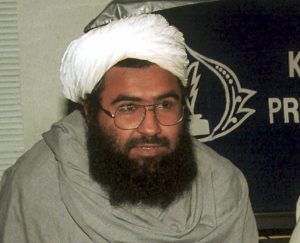Where is Jaish-e-Muhammad (JeM) chief Maulana Masood Azhar? Is the man, who is believed to be the mastermind of attacks on the Indian Parliament in 2001, on the Pathankot Air Base in 2016, and on an Indian military convoy at Pulwama in 2019 in Pakistan or Afghanistan?
Azhar’s mysterious disappearance is being debated against the backdrop of Pakistan’s efforts to get off the “gray list” of the Financial Action Task Force (FATF), the global watchdog for money laundering and terror financing.
FATF’s inspection team visited Pakistan from August 28 to September 2 to verify the country’s claim of complyiance with 34 action items before taking a decision on its “gray list” status in October. Pakistan was placed on the list in June 2018. Lately, the international community has been pressing Pakistan to arrest Azhar. In May 2019, the United Nations declared him a globally designated terrorist.
Interestingly, in February 2020, ahead of FATF’s plenary meeting, Pakistan informed the financial watchdog that Azhar along with his family had gone missing from its custody.
Pakistan had taken Azhar into custody during investigations into the Pulwama attack in Indian Kashmir. The attack left around 44 personnel of India’s Central Reserve Police Force dead and several others injured.
JeM claimed responsibility for this attack via a social media post. At any rate, the Pakistani authorities claimed that they did not find any credible evidence of Azhar’s involvement in the attack. In January 2021, an Anti-Terrorism Court in Punjab issued arrest warrants for Azhar on charges of terror financing and distributing extremist literature.
Despite Pakistani claims of Azhar’s mysterious “disappearance,” he has been actively putting out JeM publications on social media networks and urging JeM operatives to engage in militancy against India. Reportedly, following the Taliban’s takeover of Afghanistan in August 2021, he congratulated the group and termed it a great victory for regional jihadist groups. According to sources, notwithstanding the Pakistani claims, Azhar was active in his hometown of Bahawalpur in Pakistan’s Punjab province until April. In May, he allegedly left for Afghanistan to congratulate the Taliban regime on their victory and disappeared from there. According to sources, Azhar is in the Pakistan-Afghanistan border region adjacent to the Khyber Pakhtunkhwa or Balochistan provinces.
In early 2022, Pakistan raised the matter of Azhar’s presence in Afghanistan with the Taliban regime, urging it to arrest and hand him over. The Taliban vehemently denied these charges and hit back saying that Azhar was a Pakistani national and there was no possibility of his being in Afghanistan.
In September, Pakistan once again reiterated its demand, maintaining that it has shared documentary evidence of Azhar’s presence in Afghanistan with the Taliban regime. Pakistan maintains that Azhar is hiding somewhere between Kunar and Nangarhar provinces of eastern Afghanistan. The May 2022 report of the United Nations Security Council’s monitoring committee pointed out that JeM has several camps in Afghanistan’s Nangarhar province where a “few hundred” of its members are operating.
Pakistan has expedited its efforts to arrest Azhar ahead of FATF’s crucial plenary meeting in October, which will decide the fate of Pakistan’s “gray list” status. In this regard, Azhar’s trial and execution in terror financing cases are crucial.
Indubitably, Azhar has longstanding ideological and political linkages with the Taliban regime. Back in 1999, when an Indian Airlines aircraft flying from Kathmandu to New Delhi was hijacked to ensure Azhar’s release from Indian custody the plane was brought to Kandahar. After intense negotiations, Azhar was released along with Mushtaq Zargar and Omar Saeed Sheikh.
With the Taliban’s return to power in Kabul, JeM is said to be running several camps in Afghanistan and its fighters are reportedly being trained in al-Qaida’s training centers.
Yet Pakistan’s claims of his escape to Afghanistan seem far-fetched and do not stand the test of scrutiny. Firstly, the Taliban regime is weary of being dubbed Pakistan’s proxy. Since returning to power, the Taliban have tried to follow an independent foreign policy to dispel this impression, including reaching out to India to forge a working relationship. Hence, the Taliban would think twice before allowing Azhar to take refuge (read: hide) in Afghanistan. At the same time, such a decision will further weaken the Taliban’s case that it is not allowing foreign terrorists to operate on Afghan soil.
Secondly, Azhar suffers from serious kidney problems and was on regular dialysis in Pakistan. Hence, his escape to Afghanistan would have been suicidal. Given his medical condition, it is hard for him to survive without regular dialysis.
Irrespective of the FATF plenary’s decision in October, Azhar is a U.N.-designated terrorist and Pakistan will have to try him in a court of law and prosecute him for terror financing if it is keen to get permanent relief. The ruse of Azhar’s escape to Afghanistan may provide tactical relief to Pakistan but international pressure on Islamabad to put him on trial will persist.

































